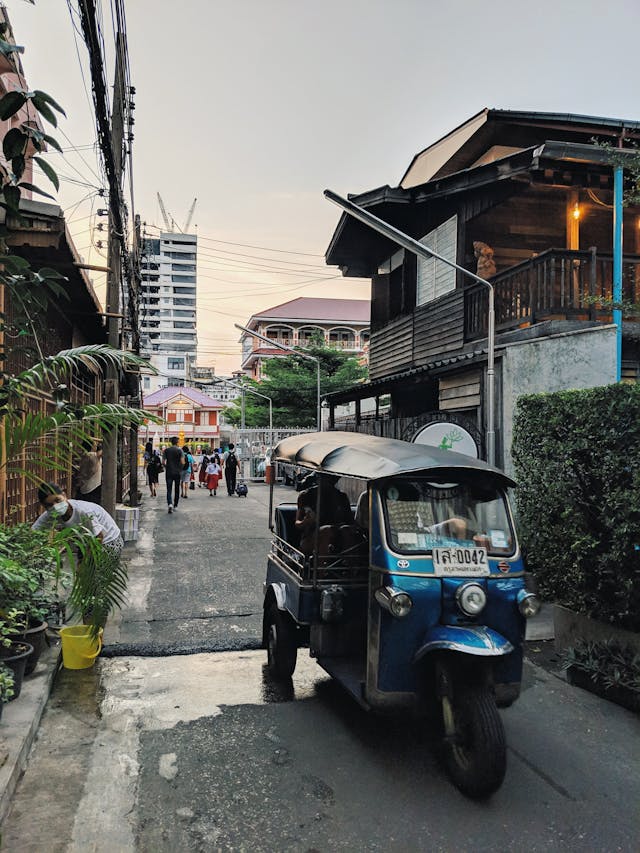CHAT
WITH US
WITH US
GET A
QUOTE
have questions? call us
+44 3330 907053

Blog • 30 Apr 2024
Share this article
Imagine sipping a cool drink beside a stunning beach. The soft sound of waves creates a peaceful life. For many from the UK, moving to Thailand is a dream. Thailand tempts with its beautiful beaches, sunny weather, and low living costs. However, moving to Thailand from UK has its challenges. You need careful planning, knowledge of international moves, and openness to new cultures. This guide gives tips for a smooth move to the Land of Smiles.

Moving to Thailand brings many financial factors to think about. Top on the list are international removal costs. It's important to budget carefully for your move. This involves looking closely at various expenses that will affect your financial plan.
While the financial aspects of moving to Thailand can seem daunting, choosing the right international moving company can significantly reduce stress and costs. At Deliver1, we specialise in international relocations, offering expertise, competitive prices, and a user-friendly system that takes the hassle out of our moves.
By choosing Deliver1, you're not only getting a cost-effective solution but also partnering with a company dedicated to making your move to Thailand as seamless as possible.
Securing the Appropriate Visa for Thailand
Starting your trip to Thailand means getting the right visa. Whether you want to work, study, or retire in Thailand, it's important to know about the different visas. We'll talk about visas for students, workers, and those wanting to retire in Thailand.
If you dream of studying or working in Thailand, it's key to learn about the necessary permits. For studying, you'll need a non-immigrant ED visa. To work, the B visa is what you're after. There's also a SMART visa for folks in certain high-tech fields. Getting a job or a school acceptance is crucial for your visa application. This shows Thailand's desire to bring in skilled people and serious students.
Retiring in Thailand is a goal for many, thanks to its beauty and friendly vibe. The visa for retirees is called the non-immigrant O-X visa. To get this visa, you have to show you can support yourself financially. Knowing these money requirements helps make your visa application go smoothly. This prepares you for a peaceful life in Thailand.
You can find all you need to know about the O-X visa on the Thai Embassy's website. Make sure to use the latest info to get your application right. This helps you secure your sunny spot in Thailand.

Moving to Thailand is a big step that needs careful planning. It's exciting, but every little detail matters.
Start by gathering all the important papers early on. This will make the move smoother and less stressful. Be sure to have these documents ready:
Always have backups for all your key documents. This helps avoid issues if something unexpected happens.
When your move date gets closer, start packing smartly. Begin early to avoid a last-minute rush. Here are a few packing tips:
Packing is tough, but these tips will help. They make moving far easier and calmer.
Item Category | Actions to Take | Notes |
| Clothing and Personal Items | Sort, select, and pack essentials suited for Thailand's tropical climate. | Storage solutions for items not needed can be arranged prior to the move. |
| Documents and Records | Keep originals and copies in a secure, easily accessible folder or file. | Digitally scan documents as an additional precaution. |
| Electronics | Check for voltage compatibility and pack necessary adaptors/converters. | Investigate local regulations on importing electronics. |
| Household Goods | Determine what to ship, store, sell, or donate. | Focus on power compatibility and space requirements. |
| Medications | Secure a sufficient supply and the necessary prescriptions for your move. | Check the legality of your medications in Thailand before travelling. |
Following this detailed checklist ensures you're fully prepared for Thailand. It sets you up for a great new start in the Land of Smiles.

Moving to Thailand brings a lively lifestyle and warm weather. But, it's vital to get to grips with the Thailand healthcare system. Before diving into the Land of Smiles, think about protecting your health. This is where public and private health insurance matter a lot.
The public healthcare system in Thailand is broad. Yet, it's mainly for Thai citizens or those paying into the Thai social security. This usually means you need a legal job there. The private sector stands out for its quality. It has English-speaking staff and short wait times. This makes it popular among expats looking for healthcare.
Here's a brief look at public versus private healthcare for your peace of mind:
Healthcare Type | Typical Services | Preferred by | Language Comfort |
| Public Healthcare | General medical services, Basic care | Thai citizens, Social security contributors | Thai (Limited English) |
| Private Healthcare | Specialised services, Expedited care | Expats, Travelers | English widely spoken |
Make sure your health and wellbeing stay intact. Research and choose the right public or private health insurance as a key move in relocating. It's wise to sort your health insurance before you get there. This will protect you from any unexpected medical costs.

Living in Thailand offers a mix of culture, food, and ease. A key part of settling in is sorting your money through secure expat banking. Thailand's cities are inviting to expats, and their banks are too. Understanding the perks of having a Thai bank account and using local financial services is crucial.
Having a bank account in Thailand makes daily tasks simpler. You can easily pay for shopping, handle bills, and get your salary. Local banks have designed services with expats in mind. They provide English support and advice to make financial tasks straightforward.
Here's a look at some Thai banks serving expats:
Bank | Account Type | Online Banking | English Support | Initial Deposit Requirement (THB) |
| KasikornBank | Savings/Current | Available | Yes | 500 |
| Bangkok Bank | Savings/Current/Fixed | Available | Yes | 1,000 |
| Tisco Bank | Savings/Investment | Available | Limited | 1,000 |
| Siam Commercial Bank | Savings/Current/Fixed | Available | Yes | 500 |
Initial deposits are low, but look at ongoing costs like wire fees and ATM charges. It's wise to chat with banks for up-to-date info on accounts and expat services.
Good financial planning is key to moving successfully, and having solid financial services in Thailand is vital. Picking the right bank helps you adjust better and ensures financial security in your new home.

Moving to Thailand means you have to understand taxes for expats. It is important to be on good terms with both the UK Inland Revenue and the Thai Revenue Department. Learn the steps and requirements to avoid double taxation and stay tax compliant in your new home.
Start by telling HMRC you're moving abroad. This action stops you from being taxed as a UK resident for overseas income. Then, turn to the Thai Revenue Department to learn about Thailand's tax system. Avoiding mistakes is crucial to prevent legal issues with tax laws.
A table clearly shows what you need to know about UK and Thai tax rules:
Action Item | UK Inland Revenue | Thai Revenue Department |
| Inform of overseas move | Prevent UK resident taxation | N/A |
| Determine tax residency status | Statutory Residence Test applicability | Resident if in Thailand >180 days per year |
| Understand taxable income | UK-sourced income liable for taxation | Global income may be taxed for Thai residents |
| File tax returns | Self-Assessment if required | Annual tax return mandatory for residents |
| Learn about double taxation relief | Possible relief on foreign income | Double Taxation Agreements consideration |
Tax laws change, so keep up to date to protect your money. If tax details seem hard, talk to local experts or accountants. They know the tax system and can protect your interests. This lets you enjoy your life in Thailand without tax worries.
Moving to Thailand doesn’t mean leaving behind your pets or vehicles. Understanding pet relocation to Thailand and importing vehicles to Thailand is key. It helps make your shift smoother. You will need to deal with car importation regulations though.
Plan early if you’re bringing your pet to Thailand. You'll need animal import permits. Pets must be microchipped and vaccinated against rabies. Also, get an import permit from the Bangkok Animal Quarantine Station. Below are the main steps and needed documents:
Step | Documentation Required | Timeline |
| 1. Microchipping | Proof of microchip implantation | Before vaccination |
| 2. Rabies Vaccination | Certification by a licensed veterinarian | At least 21 days prior to departure |
| 3. Import Permit Application | Import permit from the Animal Quarantine Station | Submit application at least 60 days ahead |
| 4. Health Certification | Health certificate issued by a vet within 10 days of travel | Close to the departure date |
Hiring a pet relocation to Thailand expert can simplify things. It may prevent delays.
Thinking about importing vehicles to Thailand? It's tough due to strict rules and high taxes. Taxes might be up to 200% of your car’s value for stays over six months. The process involves lots of paperwork. Here’s a list of the essential documents you need:
Given the high costs and complex car importation regulations, buying or leasing a car in Thailand might be better. Consider all options before deciding to bring your vehicle.
Adjusting to life in Thailand is easier with your beloved pets and vehicles. It makes Thailand feel more like home. Just plan ahead for all the animal import permits and car importation regulations. Then, your move to Thailand should go smoothly.
Living in Thailand is a chance to dive into its culture. Its history and traditions invite you to explore. Learning Thai customs deeply enriches your experience as an expat.
Thailand's festivals and temples show its serene and vibrant culture. Thais value community and respect, often greeting with a 'wai'. This bow shows politeness. As an expat, adapting to these practices shows respect and willingness to integrate.
Dressing modestly is key in Thailand, especially at temples or formal events. For women, covering up is important in professional settings. Your choice of clothing shows your respect for Thai customs. While it’s hot, dressing appropriately is still crucial for fitting into the culture.
Occasion | Recommended Attire | Notes |
| Temple Visits | Long-sleeved shirts, long trousers or skirts | Cover shoulders and knees; calm colors recommended |
| Professional Settings | Business attire; conservative dress | Women should cover chests and shoulders |
| Beach Resorts | Beachwear | Appropriate only on the beach; cover up when leaving the area |
| Casual Outings | Modest casual wear | Opt for cover-ups when moving around towns and villages |
By following Thai traditions, you show respect for the culture. Integrating into Thailand offers a chance for cultural and personal growth. This journey is a rewarding experience beyond just living in a beautiful country.
Seeking a job in Thailand offers a mix of opportunities and challenges, especially for expats. It's important to understand local employment practices and visa requirements.
Bangkok, Chiang Mai, and Phuket are the main cities for expat jobs. Sectors like education, technology, and tourism need people who speak English well. Try to secure a job before arriving by using LinkedIn or attending career fairs.
Thailand is a great place for expats to start a business. Its economy is growing, and there are good policies for startups. But, you need to understand the legal steps for setting up your business.
Career Path | Requirements | Opportunities | Challenges |
| Teaching English | TEFL Certification, Bachelor's Degree, Clean CRB check | Numerous positions in schools, language institutes, and private tutoring | Competition for well-paid placements, cultural adjustment in teaching styles |
| Tech Industry Jobs | Relevant degrees/experience, Work permit | Increasing demand for IT professionals, strong expat networks | Navigating local business practices, Visa sponsorship requirements |
| Entrepreneurship | Business visa, Understanding of Thai market, Compliance with Foreign Business Act | Government incentives for startups, Emerging markets | Complex bureaucracy, Requirement for Thai majority ownership in some sectors |
Whether you want to work for a company or start your own in Thailand, being prepared is crucial. Knowing about local conditions and rules makes things easier. Thailand offers a friendly environment for expats, but success requires smart planning and flexibility.
Moving from the UK to Thailand's exotic landscapes is thrilling, right? The secret to a smooth move is careful planning. Whether the bustling streets of Bangkok catch your eye or you prefer the peaceful islands, you need detailed preparation. This includes sorting out visas and healthcare. Getting these basics right now makes for an exciting life in Thailand.
It's not just about booking a flight and finding a place to stay. It means diving into a new culture and dealing with lots of paperwork. It also marks the start of a new chapter in your life, be it work or personal. Using the skills of specialist movers like Deliver1 can help. They know all about customs and logistics, making your move as smooth as can be.
As the moving day gets closer, think about the good times ahead. Thailand, the Land of Smiles, is a beautiful mix of old culture and new living. It’s great for expats. With the right plans for visas, healthcare, and learning about the culture, moving there can be fun. You’re on your way to adding new stories to your life. Are you excited for the new adventures in Thailand?
We love hearing from you-so please get in touch with any questions or queries.
We love hearing from you-so please get in touch with any questions or queries.
Working hours
Mon - Sat: 08:00 - 17:00
Sun: Closed
Call
+44 3330 907053Location
Unit 3, Newyears Green Lane
Newyears Green
Uxbridge
UB9 6LX
United Kingdom
